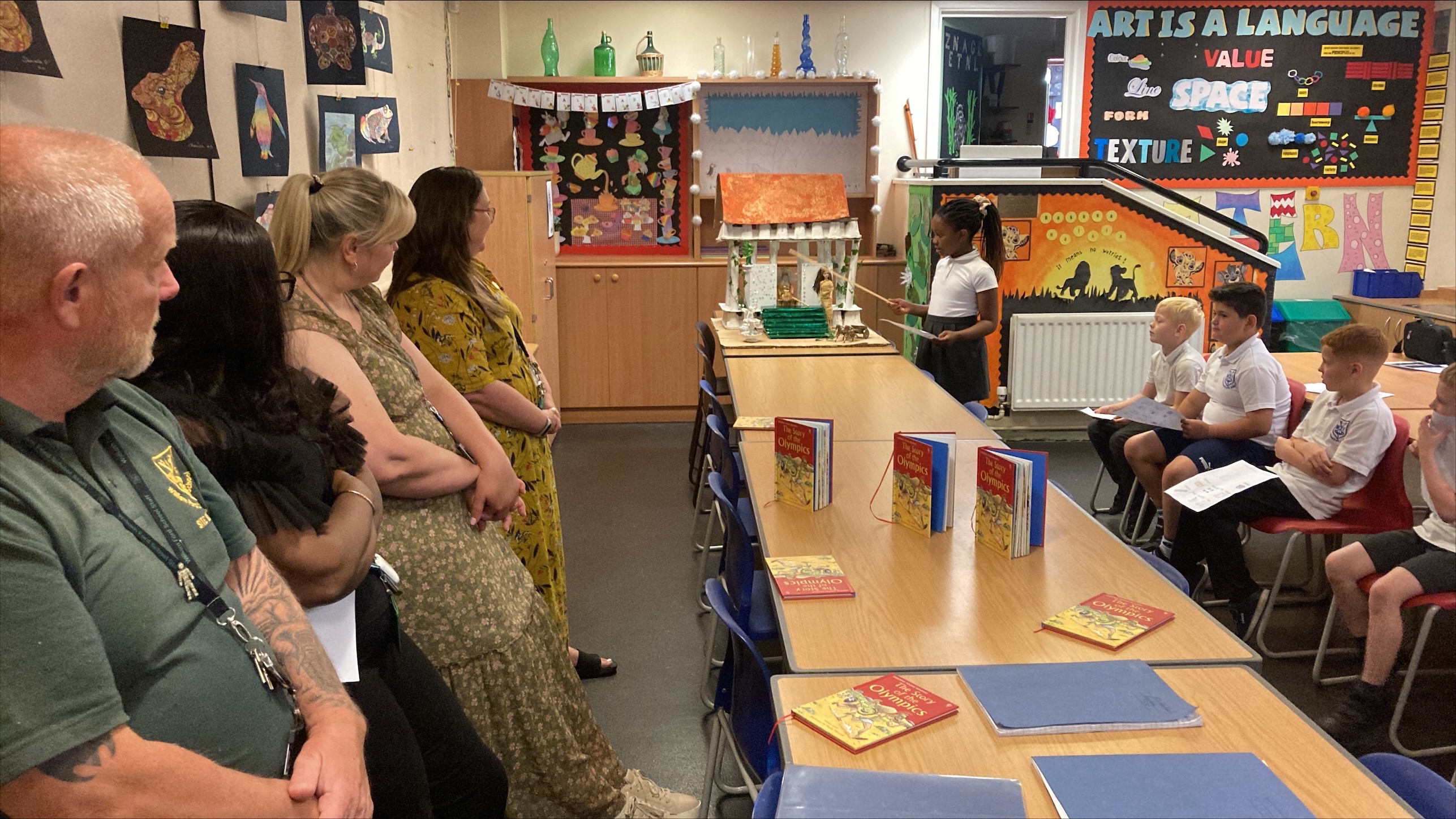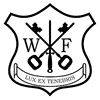
Our curriculum intent applied
Our context (London Borough of Barking and Dagenham and Village ward)
With Barking and Dagenham being one of the most deprived areas of the country, and the school’s foundation being ‘to educate the local poor,’ our vision provides the path not only to improve the lives of all pupils but for them to better the lives of others around them within the school, locality and further afield. Our transformational education provides a route out of poverty through the raising of aspirations and encouraging our pupils to work diligently. As a result...
|
We want our pupils to thrive and not just survive in life. To be successful. To be healthy. To be happy. To be empowered to make a difference. |
Language and Literacy (English and MfL)
Our intent
Inspired by our Christian vision, we believe that education is the route out of poverty and to a successful future within Barking and Dagenham. As a result we:
|
Our school intent |
How we apply this in Language and Literacy |
|
To be successful:
|
The English curriculum enables children with the opportunity to read and look in depth at a wide range of genre books linking to the foundation curriculum. For example: Revolt against the Romans linking to the Year 4 History Romans unit; James and the Giant Peach linking to the Year 3 PSHE unit ‘celebrating differences’; Hidden Figures linking to the Year 5 space unit in science and Street Child in Year 6 supporting their history unit on The Victorians. English lessons provide children with opportunities for written and spoken outcomes of lessons. Across units of work, there is coverage of drama, role play debates across the curriculum. Each unit of work builds towards the children creating an end piece of writing for a range of different purposes and genres. Lessons are recorded in a variety of ways, having written outcomes and oral work being presented through photographs and videos displayed using QR codes.
The English curriculum overviews outline learning objectives and success criteria; providing a structure and outcome to each lesson. Knowledge and skills are consolidated throughout Key Stage 2 applying grammatical terms and writing skills to a range of writing purposes. Children are encouraged and supported to develop their vocabulary and language in both written and spoken tasks; this is prompted through the online resource ‘Widgit’. This enables children to have visual support through symbols, giving visual meaning to words. Curriculum overviews are adapted and personalised for children to assist them in working parallel to their peers. Shared reading enables discussions and book talk through adapted questioning, allowing all children to develop the love for reading. |
|
To be healthy:
|
Children are given the opportunity share and discuss their opinions and thoughts on what they are reading. World Book Day encourages children to celebrate reading and the joy it brings each other. Shared Reading lessons provide children with the opportunity for book talk, where they can form and discuss their opinions on characters actions and events. Within English, children are encouraged to share their ideas and thoughts on during discussions and debates. During themed days such as: Vision, Values and Spirituality, children have the opportunity to express their thoughts and beliefs through a range of writing purposes. These range from poetry, (shape, acrostic, diamante and kennings) political speeches and manifestos, pledges, recounts, summaries and leaflets. In year 6, children use their knowledge from their geography unit on ‘Mountains’ to write a balanced argument on whether ‘Should tourists be allowed to climb mountains’ as well as focusing on the geographical reasons, children also explore the physical and mental health benefits this can bring.
|
|
To be happy:
|
We provide children with excursions to France; this opportunity enables children to experience a new culture and apply and practise their oracy skills in speaking with locals. As part of the Year 5 curriculum, children visit a West End show, for instance Matilda and Frozen. This enables children with the opportunity to see a story brought to life on stage and see first-hand other roles and responsibilities linked with theatre and production. The Year 3 and 4 curriculum sees children explore instructional writing; building on skills and following their own instructions to create products for the school community.
|
|
To be empowered to make a difference:
|
In a Year 5 unit, guest speakers from the Stand by Me charity are invited to speak to the children about their work and how their role contributes to the wider community. This leads onto children producing their own leaflet about Stand by Me recognising the significance of their work. Within Year 6, children perform an end of year production to an audience incorporating singing and drama around a theme. During a theme day centred around Colombia and regular updates to their Stand by Me sponsor child, children explore different writing genres to promote their local area and events which have occurred and discover more about Colombia.
|
.JPG)
STEM (Science, DT, Computing, Maths)
Our intent
Inspired by our Christian vision, we believe that education is the route out of poverty and to a successful future within Barking and Dagenham. As a result we:
|
Our school intent |
How we apply this in STEM |
|
To be successful:
|
In maths, children are aware of how the skills they are learning today can help them later on in life. The STEM curriculum areas promote future career prospects enabling children to think about what they want to achieve in life and the importance of particular subjects. In Year 5, children become ‘Paratroopers’ applying their scientific knowledge from their forces unit to design and construct a successful parachute. In DT, our year 6 children have the opportunity to cook a three-course meal and produce a ‘Come Dine With Me’ style show promoting the role of a chef and a producer. Throughout STEM week, the children engage with a range of online workshops such as TFL, NHS and Astrophysicists – which promotes ambitious careers |
|
To be healthy:
|
Throughout their time at William Ford, children are exposed to many different experiences that they may not experience at home - one of these is cooking a meal. Every child in every year group have the opportunity to cook or bake whether this be constructing fruit kebabs or baking scones. In Year 6, children cook a three-course meal which they serve to their parents. Our Year 3’s have the opportunity to visit Pizza Express and prepare their very own pizza which they eat for lunch. Children at William Ford have the opportunity to represent their school.
Children are able to discuss and debate well the scientific views of a range of scientists. They are encouraged to form their own opinions. When working scientifically, children use knowledge learnt from previous lessons to form their own ideas and to collaborative discuss these with others.
All year groups have the opportunity to cook and prepare a healthy dish with our school cook. In Year 3, they prepare fruit kebabs with a range of different fruits which are in season. In Year 5, they prepare a delicious pasta sala with a variety of vegetables such as bell peppers, cucumbers and red onions. In Year 6, they ahve the opportunity to cook their own healthy pizza on a wholemeal pitta break – chopping their own vegetables for their toppings. |
|
To be happy:
|
Children at William Ford have the opportunity to represent their school. Some of our Year 5 and 6 children have the chance to represent the school in ‘Moneywise’ - a maths challenge. The children also get the opportunity to represent their school at the boroughs Science Fair – highlighting their great work across the year. Science gives our Year 4’s the opportunity to visit London’s greatest Science Museum.
Our Year 5 children are fortunate enough to visit the famous Bishopsgate Market. They delve into life as a fishmonger learning about the skills needed. A brief history is given about the local area before children have the opportunity to become a fishmonger themselves. They are able to prepare fishes such as prawns and squids – they then cook a stir fry with their freshly prepared fish to take home and enjoy.
|
|
To be empowered to make a difference:
|
During Enterprise week, children can raise money for our StandByMe charity. They make decisions on what they must sell and have a set budget on this which brings in their mathematical understanding of money and what it means to make a profit. |
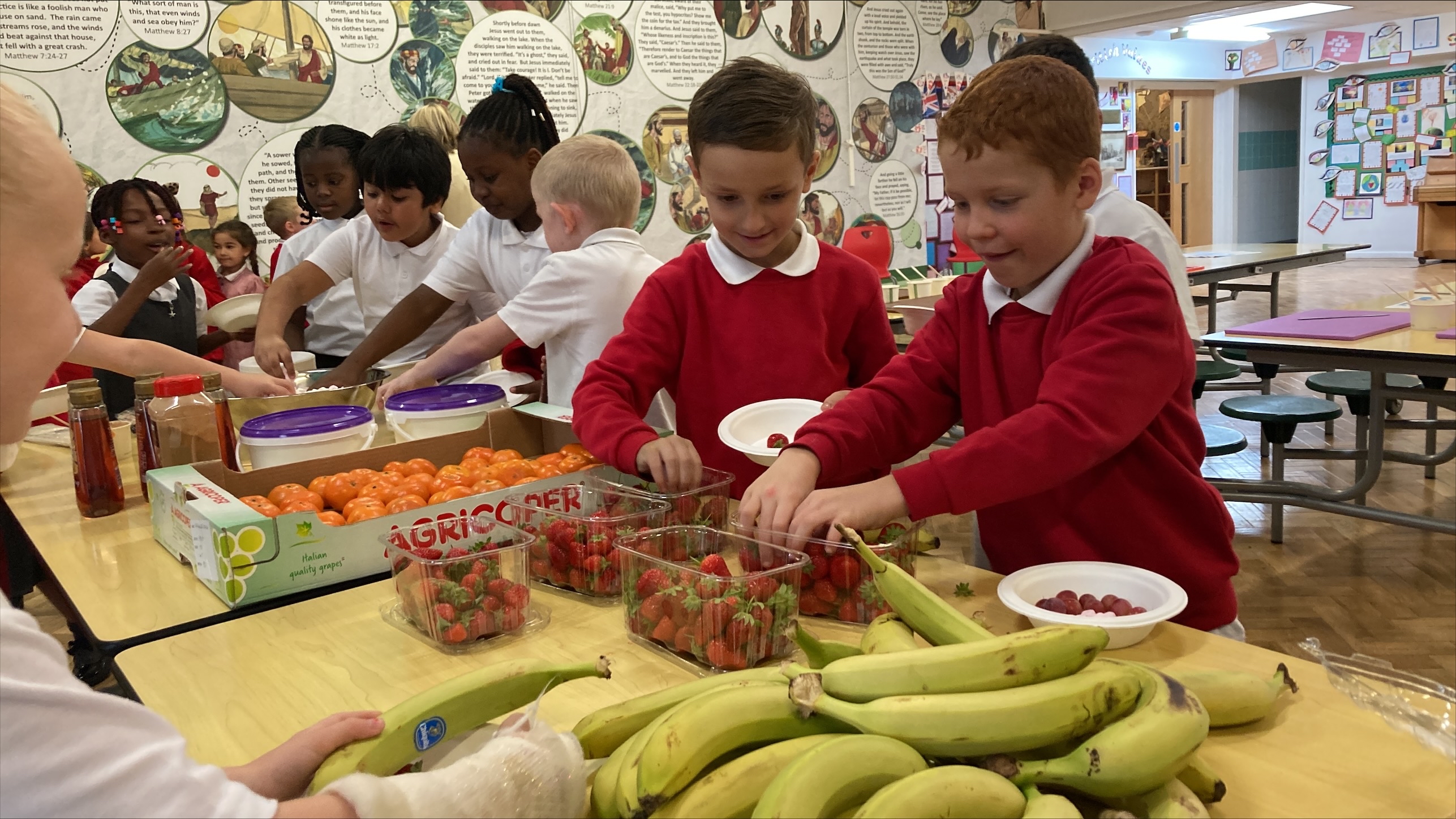
Humanities (RE, History, Geography)
Our intent
Inspired by our Christian vision, we believe that education is the route out of poverty and to a successful future within Barking and Dagenham. As a result we:
|
Our school intent |
How we apply this in Humanities |
|
To be successful:
|
In history, we utilise the role of historian in all aspects of our enquiries. In year three, we specifically act as Egyptologists when completing tasks and refer to the work of archaeologists and historians, with reference being made to specific people taking on this role (Howard Carter, Herodotus etc.). Year four complete tasks as archaeologists, enquiring into the William Ford Bronze Age Hoard. These roles are continued throughout enquiries in the upper school. In geography, year three take on the role of geologists and volcanologists whilst exploring Volcanoes. They also act as cartographers, making maps of their class islands, a role that is returned to throughout the geography curriculum. Tourism is specifically focussed on in year six through the work on South America.
All three subjects take on the form of enquiries with children answering and posing their own questions. They encourage critical thinking (should be dig up people who have been buried or what does this artefact tell me about the past / other people’s beliefs etc.?) Mapwork in geography is a useful skill for later life and future studies. Studies on climate change (geography) and stewardship (RE) ensure that children are thinking about how humans need to have a positive impact on and in the world. |
|
To be healthy:
|
Debate and discussion of belief in a religious and worldview context underpins all RE lessons in all year groups. Children are encouraged to form their own opinions and to learn to disagree in a constructive way. They consider the role of humans as stewards of creation in both years three and six. History lessons encourage children to think about the past and how it is interpreted and to consider the implications of aspects of historical enquiry (e.g., year three debate whether it is appropriate to study the past by digging up people who have been buried and laid to rest). Geography regularly looks at the impact that humans have on the world. Examples being the impact humans have had on the River Ganges in India and the impact of deforestation of the Amazon rainforest (Year 4). Year six think about how the local area meets the needs of its residents and why this is necessary. |
|
To be happy:
|
History gives opportunities to visit castles and museums. Year four visit Colchester Castle with links to their work on the Iron Age and the Romans. Year three participate in theme days based on their studies of Ancient Egypt and Ancient Greece. On both occasions, a range of creative activities take place, and the children are visited by a theatre group giving the children the opportunity to actively participate in the production. RE gives opportunities to interact with people of other faiths and to view religious buildings with year three recently completing a virtual tour of Bevis Marks Synagogue in the City of London. This event was run by the Jewish Museum. Further connections are being pursued to make visits to other religious buildings. RE gives opportunities for courageous advocacy, encouraging children to think about how we can be useful in the local community (litter picking, singing in Parkview Care Home). Geography will see year three this year visiting a coastal area (Walton) and visiting both the town and Naze beaches. |
|
To be empowered to make a difference:
|
In year three, when looking at coasts, children recognise the differences between coastal regions and our local area and investigate the importance of looking after our coastal areas. They consider the impact that the neglect of coastal regions would have on the world. Year four geography makes comparisons between the UK and a region of Europe, specifically Scandinavia. In year six geography lessons, children investigate the local area, creating their own enquiries into how the local area meets the needs of the community. Their studies help them to see the role of the local area in the wider community and its role within the UK. Year six also complete a historical enquiry of Barking and Dagenham in which they look at the role that significant people have had on both a local and national scale. Examples of these are their enquiries into the changing role women in the area culminating in an enquiry into the Ford Factory machinist strikes and their impact on equality and fair pay in the workplace in this country. |
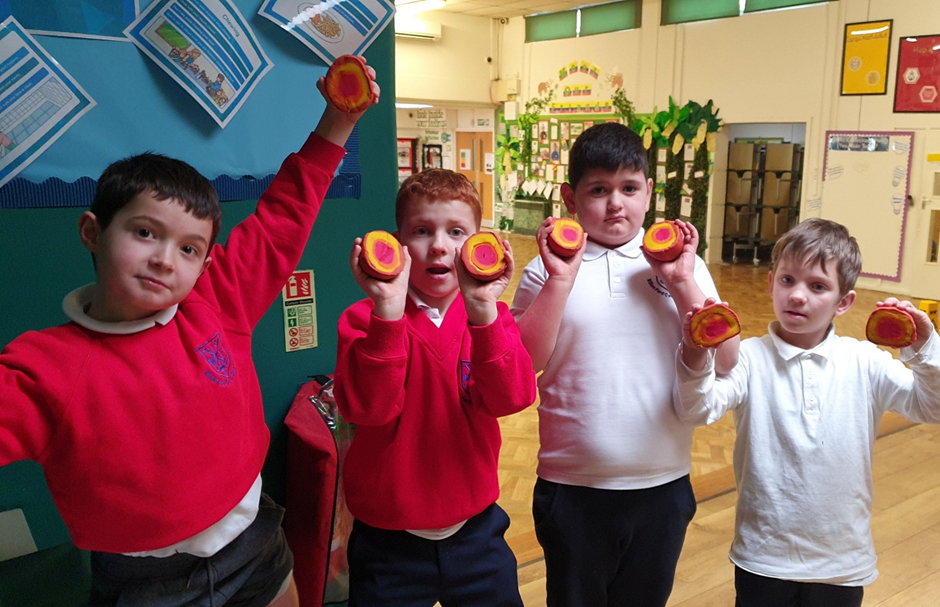
Creative and Wellbeing (Art, Music, PE, RSHE, PSHE)
Our intent
Inspired by our Christian vision, we believe that education is the route out of poverty and to a successful future within Barking and Dagenham. As a result we:
|
Our school intent |
How we apply this in Creative and Wellbeing |
|
To be successful:
|
Through creative subjects and topics, such as Art, Music and PE, pupils are able to express themselves and we pride ourselves at William Ford, in the support in which we provide for our pupils, enabling every pupil to reach their potential and beyond, academically and emotionally. Pupils are exposed to a wide variety of career opportunities and the learning in creative subjects lends itself well to purposeful learning. During pupil voice, pupils clearly aspire to pursue careers in the sport and fitness industry, as well as in art and music. We have a school choir, as well as a weekly band practice across all year groups, run by iRock. Many pupils have experienced being part of productions, music festivals and events within school and externally. These experiences, coupled with our excellent music provision has further inspired pupils to aspire to be a musician or to work in the music and film industry. We are involved in community art projects, as well as collaborating with secondary schools and having visits from illustrators, in conjunction with our enterprise projects. As well as this, we offer a varied, ambitious art curriculum including topics, such as artist focuses and photography. This has inspired many pupils to want to pursue a career involving art.
Through creative subjects and topics, such as Art, Music and PE, pupils are able to express themselves and we pride ourselves at William Ford, in the support in which we provide for our pupils, enabling every pupil to reach their potential and beyond, academically and emotionally. Through our Mini Marathon scheme, our WOW travelling to school initiative, our alternative sport provision, as well as our ‘Get fit, get healthy’ club, run twice a week and our girls only multisport, we are addressing the statistics related to the borough of Barking and Dagenham and providing our pupils who may be reluctant to participate in team games and competitive clubs to participate and experience other ways to exercise and to succeed academically and emotionally. Through the Art club, run every lunch time, as well as our Art specialist and specific Art room, we offer effective support to all pupils, ensuring they have the space and time to express themselves and pursue their artistic goals and aspirations. |
|
To be healthy:
|
In creative and well-being, we promote healthy lifestyles by exposing children to a range of physical activities, including alternative and paralympic sports in PE, trips and visits including climbing, kayaking and archery, as well as various purposeful clubs, such as our ‘Get fit, get healthy’ club, run twice a week and our girls only multisport to inspire girls to engage with sport and feel empowered. This empowers pupils and enables all pupils to experience sport in a variety of ways that in turn has generated aspirational influences, with many of our children wanted to pursue a career in the sport and health industries.
In creative and well-being, we provide engaging, enriching activities and experiences which allow our pupils to make purposeful choices, as well as adopting a healthy lifestyle and contributing to the community. In PSHE, we have a carefully thought-out curriculum which covers topics, such as Health and Well-being, Hopes and Dreams, as well as Being me in this world. Through the units mentioned, as well as the multiple well-being initiatives that we run, such as our recent whole school project, supported by the Institute of Imagination, where the pupils learned to look inward, looking at ways to better themselves, pupils are able to make decisions to adopt a healthy lifestyle.
Our faith-based ethos is at the centre of everything we do at William Ford and each of our creative subjects are underpinned by our vision and values. Each topic starts with a ‘Big question’ which allows pupils to engage with their spirituality. In PSHE, our curriculum caters to allowing pupils to feel respected, confident in their own beliefs, to be tolerant of other beliefs, as well as creating curiosity about the world around them. |
|
To be happy:
|
Through our ambitious and creative curriculum, we enable pupils to develop rich cultural capital, of which they would not normally experience. This is partly through our offer and promise of ‘11 engaging activities’. Our sports premium is focused on giving pupils opportunities, such as experiencing alternative sports and events, such as taking part in archery, kayaking and watching a live sports event. Through our Mini Marathon scheme, our WOW travelling to school initiative, our alternative sport provision, as well as our ‘Get fit, get healthy’ club, run twice a week and our girls only multisport, we are addressing the statistics related to the borough of Barking and Dagenham and providing our pupils who may be reluctant to participate in team games and competitive clubs to participate and experience other ways to exercise and to succeed academically and emotionally. Through the Art club, run every lunch time, as well as our Art specialist and specific Art room, we offer effective support to all pupils, ensuring they have the space and time to express themselves and pursue their artistic goals and aspirations.
In creativity and well-being, we enable all pupils to explore their creative traits, as well as expressing their opinions, beliefs and differences. Through our music curriculum, pupils are able to discuss and explore their favourite genres of music, learning how to agree and disagree in a pleasant manor, as well as expressing themselves through units such as: Looping and remixing, where Year 5 pupils collaborate with Dagenham Park School’s music department, learning once a week in Dagenham Park’s music facilities, through their state of the art music resources and software, how to create their own piece of music, using looping and remixing techniques. This enables pupils to explore and express themselves in groups, disagreeing and compromising, whilst working towards their end outcome. Our big questions and values feed into every unit and pupils discuss these and make links to faith, beliefs and attitudes towards learning and life. |
|
To be empowered to make a difference:
|
At William Ford, ‘Pupil voice’ is very important to us and we have three different pupil councils, including: Worship council, School council and our Eco council. These pupil groups are diplomatically voted for, and pupils have a key part in the changes, improvements and developments of the school. Through our pupil-created collective worship topics, as well as multiple community events, including community breakfasts, ‘William Ford presents’ and our iSingPop Christmas concert, pupils are able to understand and contribute to making a difference to the community in which they live, through acting generously. Through community month, enterprise week and regular work in the community: working with the local care home, the local Dagenham arts community group, supporting and communicating with our ‘neighbours’ in Columbia, through Stand by Me, pupils are able to recognise their role within the local, national and global community. Art, music and PSHE are at the forefront of these community projects, as we invest in singing and spending time with the residents at the local care home; we design artistic pieces to be part of our community and we recognise the benefits on well-being of collaborating with the community. |
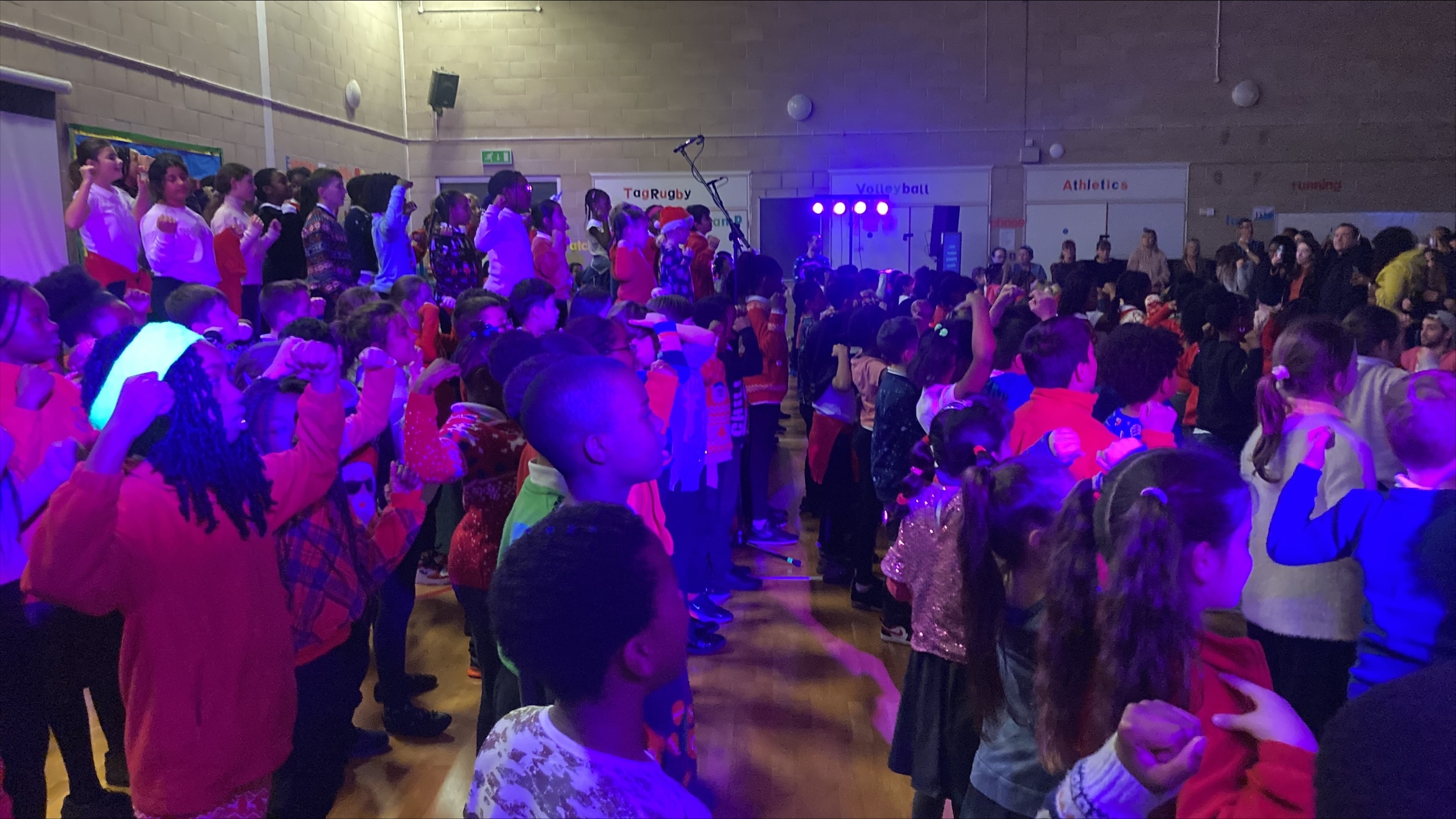
SEND and Inclusion
Our intent
Inspired by our Christian vision, we believe that education is the route out of poverty and to a successful future within Barking and Dagenham. As a result we:
|
Our school intent |
How we apply this in SEND and inclusion |
|
To be successful:
|
Within our ambitious curriculum all children are exposed to a range of different career options, exposing them to the range of jobs and possibilities that are open to everyone, regardless of their need or ability. The relevance of the curriculum and the link to possible career options is made explicit so that pupils can better see the value of their learning. We recognise that not all children can express their learning in the same way, therefore we strive to remove their barriers to learning. Lessons are adapted and we use careful support and scaffolding to enable all children to access the same learning intention. We ensure that transferable skills of critical thinking, collaboration, creativity and communication are central to the teaching and learning that takes place in our classrooms. In order to support this intent, we work closely with professionals in a range of fields and are always seeking ways to develop this further. For example, we work with a local artist to create a mural for the local train station; the police work closely with year 6 pupils to build positive relationships and expose them to the range of careers within the force; the royal ballet run dance lessons with year 3. The majority of our SEND pupils have fall into the social and communication area of need. Therefore, we have developed a range of individualised strategies to allow pupils to express their gains in knowledge as well as having their needs and wants understood by others. One of the successful tools we use is Widget symbols used to help aide communication and understanding of language. We also use technology to remove barriers and meet the specific needs of pupils with tool such as Nessy (dyslexia) and Flash Academy (EAL). The Brilliant Club is another example of the way in which the school ensures effective support for pupils. Children who are identified in the upper school who are less advantaged, work with universities across the UK to experience life beyond school age and to widen their horizons, encouraging them to be successful in their future careers. |
|
To be healthy:
|
To promote physical health within our school, we encourage all pupils to participate in PE lessons. Where necessary, these lessons are adapted to meet the needs of individuals. To promote inclusion in this subject, each year group focuses on one paralympic sport for a half term e.g. in year 3 the children learn Boccia. We also think it is important that children have an opportunity to represent their school in a sporting event. Each year, children are invited to participate in the local Panathlon , where they compete against other school in different event. As well as academic interventions, we recognise that the whole child needs to be nurtured and we need to ensure children have a regulated mind set to learn and make the best choices. We have a full-time learning mentor delivering emotional and behavioural support for pupils across the school. She will support children with any barriers to their learning and guide to be successful in society. Recognising the importance of this for their future success, we have invested in Place2Be. This mental health charity works within our school and offers a range of services, including 1-1 counselling, drop-in session, and parental advice. Our school community has a wide range of faiths and beliefs. We welcome children and families from all backgrounds and encourage individuals to be inquisitive about their faith and that of others. This is reflected in our curriculum. |
|
To be happy:
|
We have 11 experiences that we want to offer all pupils during their four years at William Ford which range from visiting a foreign country to serving within the local community; representing the school in sport, music or art to learning to cook a meal. One of these experiences in to attend a West End production, all pupils have the opportunity to attend and where a child has a specific need, we will always endeavour to ensure these barriers are removed. Positive behaviour is embedded within our school ethos and is promoted through exciting rewards and incentives. We recognise that while it is important to work collaboratively towards a mutual goal, we also reward individual achievement. For example, children can earn a ‘Golden Ticket’ for their dinner hall etiquette, where they can receive a special lunch. These incentives encourage bother academic and social growth for all pupils. Zones of regulation is a school wide tool used to help children understand and regulate their own emotions. Children sometimes do not understand how they are feeling or why and this tool enables them to share their thoughts and feelings with staff in a pictorial manner. Staff, including the learning mentor, will then be able to support the children in developing strategies to manage their emotions independently. At William Ford, we follow the Jigsaw PSHE curriculum to connect the pieces of Personal, Social, Health and Well-Being Education. The lessons teach children and young people emotional literacy, social- and lifelong skills, RSE/RSHE and resilience in an age-appropriate manner. In the unit “Celebrating Differences” children look at and celebrate what makes us all unique and why it is important to respect each other and promote peace. We also celebrate diversities during Awareness weeks e.g., children mental health, autism awareness to raise the profile and understanding of pupils and staff with in our school and wider community. |
|
To be empowered to make a difference:
|
All children have the opportunity to contribute to the school vision. Through councils, such as our learning council, children have had input into the development of the school library and the selection of books purchased. Each year, we hold a community month. During this time, children are encouraged to participate in activities that will positively impact our local community. For example, litter picking in the park and visiting a local care home, reading stories and engaging with the residents. We regularly host events at Christmas, Easter and summer that are open to our school community. Making a difference within the wider world is demonstrated through engagement with Stand by Me and our children’s’ contributions to a mural to be enjoyed at Heathway Station. In every experience, a child’s ability is no barrier to engagement and inclusion. |
